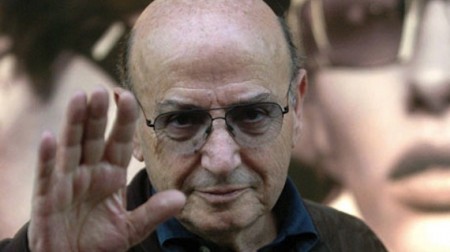
Greek director Theodoros Angelopoulos died yesterday 24 January 2012 while on a shooting on the ring road (‘periferiako’) in Piraeus,a road that connects the central port to Drapetsona and Keratsini,mostly industrial areas. It was dark,it was raining a thin powdered mist and he was working. While crossing the road,after the first tunnel,he was hit by a motorcyclist who did not see him. No security to prevent it;nobody was there to stop the traffic,evidently. Both men were taken to the hospital in Neo Faliro,and not long afterward the director died due to the injuries he suffered. His last film will never be completed,not by him.
Somebody would say that the destiny of a director,as the one of a warrior,is best fulfilled if one dies on a shooting. In this Angelopoulos’story is closed by a tragedy that takes an involuntary heroic flavour. Nevertheless,there is nothing mythical in this accident and Greece is in shock. Filmmakers in Athens,and all over Europe,have been discussing the event since last night. We are all saddened by the circumstances of this death;by the unfair way this man lost his life.
Passing by,nobody would have imagined it was the set of a shooting. There was not much of a sign of such a happening taking place. Then,two ambulances;then,many people,police,and a sudden immobility of the traffic. One can’t but ponder on this fact:if only such an immobility belonged to the security measures enforced to make the shooting safe,Theo would be still with us.
But of course,only afterwards nothing moved on that road;people were forced to wait,unaware of whose accident that was. And so,in this,the famous director became just a man on the asphalt;no popularity,no fame. His accident was not different to those of many another men who found themselves in the same circumstances. Reached the hospital,he died.
The news was spread by a short interruption of the broadcasts minutes before midnight. Then,disbelief started to grow inside many of us,sadness inhabited our movements,the impossibility to rationalize the happening became a deep rage. Finally,we simply hated the way things were done on that road,on that job. The King of Greek cinema is dead. It happened to him and it could have been each of us on any shootings,in any nights on the job. This is what is left once the grief makes room to thoughts;hopefully such a loss will guide us in preventing others,in stopping them from happening out of the same mistakes.
As for the director,let me spend a few words on his life and work.
Angelopoulos studied law at the National and Kapodistrian University of Athens,but after his military service went to Paris,attended the Sorbonne and soon dropped out to study film at the Institute of Advanced Cinematographic Studies. Film critic for left-wing journal Dimokratiki Allaghi (Democratic Change) until its suppression in 1967,he worked as lawyer until 1969 and began his association with cinematographer Giorgios Arvanitis on the film Reconstruction,in 1970. He also taught at Stavrakou Film School in the 1970s.
Angelopoulos began making films after the 1967 coup that began the Greek military dictatorship known as the Regime of the Colonels. In the 1970s he began making a series of political feature films about modern Greece,and quickly established a characteristic style marked by slow,episodic narrative,as well as very long takes. Angelopoulos has fourteen feature films to his name,and one might argue that his most famous work is The Travelling Players completed in 1975.
For a more complete overview of his work and life,visit his official website:http://www.theoangelopoulos.com/